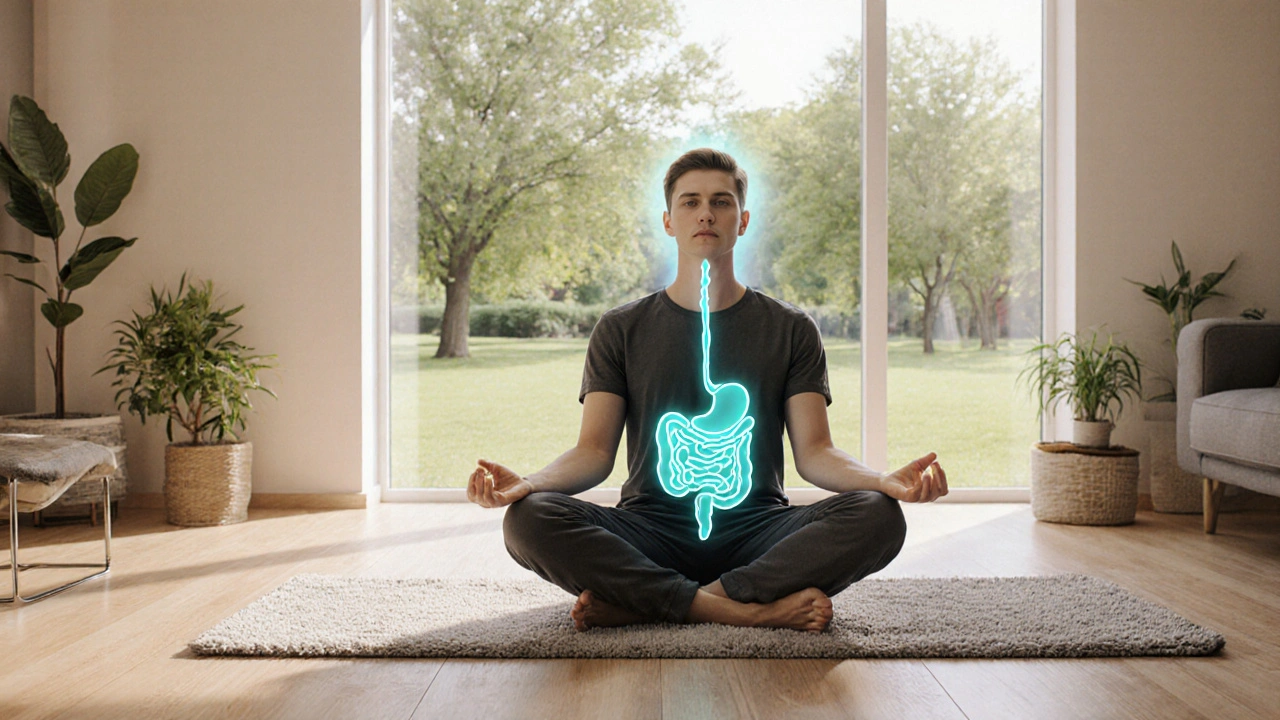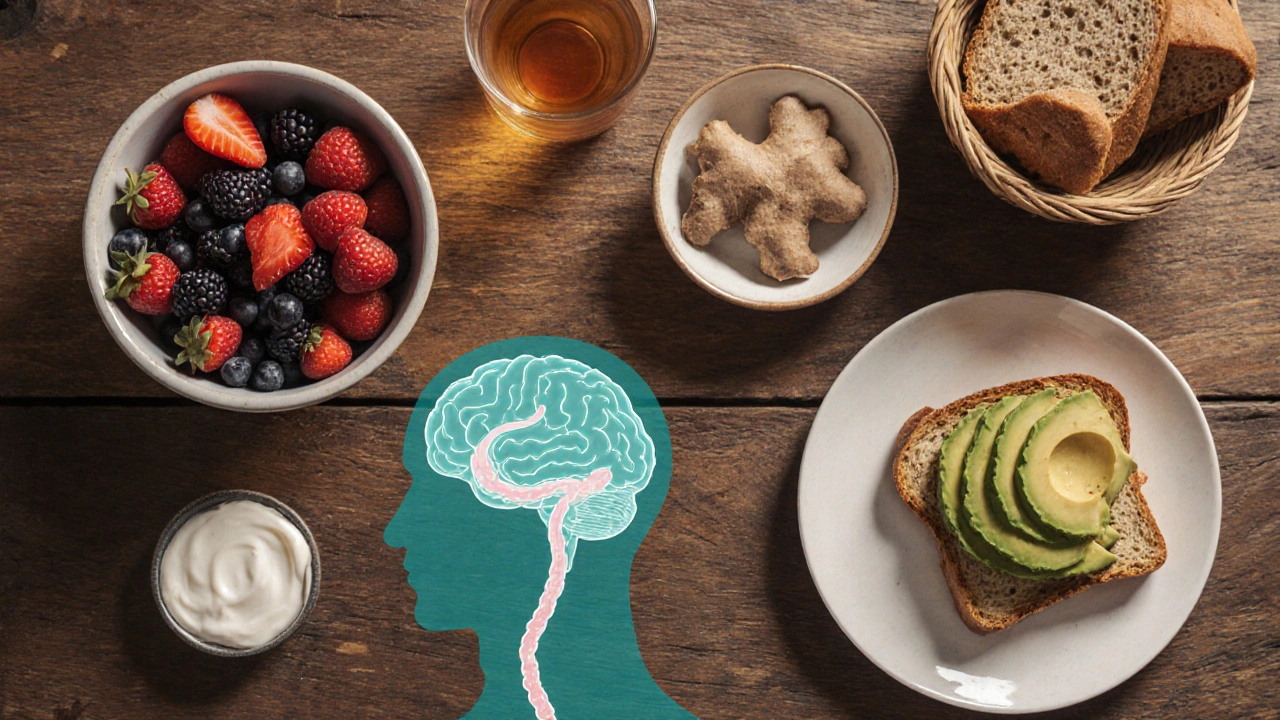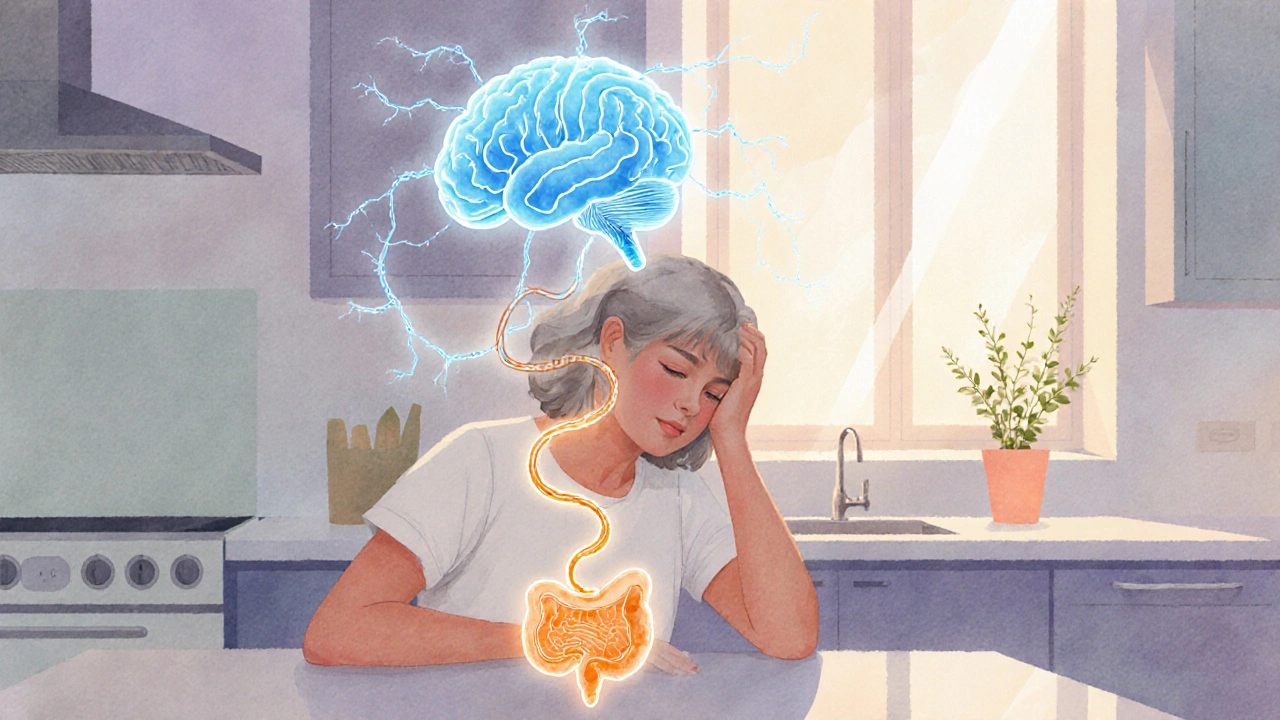Stress & Anxiety Constipation Quiz
1. What is the main reason stress causes constipation?
2. Which part of the nervous system is primarily involved in the gut-brain axis?
3. Which of the following is NOT a behavioral shift caused by stress?
4. What role does anxiety play in constipation?
5. Which probiotic strain is mentioned as helpful for stress-related constipation?
Key Points
- Stress and anxiety disrupt the gut‑brain axis, slowing intestinal movement.
- Hormonal shifts and muscle tension are the main physiological culprits.
- Diet, hydration, and simple relaxation techniques can reverse the effect.
- Persistent symptoms require a medical check‑up to rule out underlying disorders.
- A quick‑reference table shows how stress and anxiety differ in their impact on bowel habits.
When the mind is racing, the gut often follows suit. Stress is a physiological response to perceived threats, releasing cortisol and adrenaline that prepare the body for "fight or flight." Anxiety is the lingering, often chronic, worry that keeps the nervous system on high alert. Both conditions tug at the same nervous pathways that control digestion, and the result can be an unwelcome slowdown: constipation.
Understanding the Gut‑Brain Connection
The gut is sometimes called the "second brain" because it houses the enteric nervous system (ENS), a network of over 100million neurons that operate independently but stay in constant dialogue with the central nervous system. This two‑way street is known as the gut‑brain axis, a communication highway involving neural, hormonal, and immune signals.
When stress spikes, the hypothalamic‑pituitary‑adrenal (HPA) axis fires, flooding the bloodstream with cortisol. Cortisol tells the colon to retain water and slows the rhythmic contractions called peristalsis. Anxiety, on the other hand, often triggers the vagus nerve to become overactive, leading to erratic muscle tone and reduced coordination of the pelvic floor muscles. Both pathways end up with stool lingering too long in the colon, where excess water is reabsorbed, producing hard, difficult‑to‑pass stools.
How Stress Directly Triggers Constipation
Here are the three primary mechanisms:
- Hormonal interference: Elevated cortisol increases the reabsorption of water in the colon, making stool drier.
- Muscle tension: Stress often tightens the abdominal and pelvic floor muscles, creating a physical barrier to smooth passage.
- Behavioral shifts: Under pressure, people tend to skip meals, drink less water, or choose low‑fiber comfort foods-all of which reduce stool bulk.
Even short‑term stress-like a deadline or a traffic jam-can cause a temporary slowdown. Chronic workplace pressure, however, keeps the HPA axis activated, turning an occasional hiccup into a recurring problem.
Anxiety’s Subtle but Powerful Role
While stress is often linked to a clear trigger, anxiety can be more nebulous. The main ways anxiety fuels constipation include:
- Hyper‑vigilance of the gut: People with anxiety may become overly aware of every rumble, leading to a “hold‑it‑in” response.
- Increased sympathetic activity: The fight‑or‑flight response diverts blood flow away from the digestive tract, dulling motility.
- Disrupted sleep: Anxiety frequently interferes with sleep, and poor sleep is associated with slower GI transit.
Research from the University of Johannesburg (2023) found that participants with generalized anxiety disorder reported 30% more days of constipation per month than non‑anxious controls, even after controlling for diet.

Spotting the Signs Early
Recognizing constipation before it turns chronic makes treatment easier. Typical warning signs include:
- Fewer than three bowel movements per week.
- Straining or a sensation of incomplete emptying.
- Hard, lumpy stools (Bristol Stool Chart type1‑2).
- Abdominal bloating or discomfort that worsens after meals.
- Feeling of pressure in the rectal area, especially during periods of heightened anxiety.
If any of these symptoms persist for more than two weeks, it’s time to evaluate lifestyle and, if needed, seek professional advice.
Practical Strategies to Undo the Constipation Cycle
Below is a step‑by‑step plan that tackles both the mental and physical sides of the problem.
- Hydration reset: Aim for at least 2L (about 8 cups) of water daily. Adding a pinch of sea salt or a splash of citrus can improve electrolyte balance, which aids smooth muscle function.
- Fiber boost: Target 25‑30g of fiber per day from whole grains, legumes, fruits, and vegetables. Soluble fiber (like oats) forms a gel that softens stool, while insoluble fiber (like wheat bran) adds bulk.
- Movement matters: A 20‑minute walk after meals stimulates the gastrocolic reflex, prompting peristalsis. Even brief desk stretches-especially hip‑flexor and pelvic‑floor releases-help reduce muscle tension.
- Mind‑body techniques: Try 5‑minute diaphragmatic breathing or a short guided meditation when you feel anxiety rising. Studies show a 15% increase in bowel frequency after daily mindfulness practice for four weeks.
- Regular bathroom schedule: Set a consistent time (e.g., after breakfast) to sit on the toilet for 5‑10minutes, even if you don’t feel the urge. This trains the colon to adopt a rhythm.
- Limit stimulant drinks: Excess caffeine or energy drinks can increase sympathetic activity, worsening constipation. Switch to herbal teas like peppermint or ginger, which have mild relaxant properties.
- Consider probiotics: Strains such as Bifidobacterium lactis and Lactobacillus rhamnosus have been shown to improve stool frequency in stressed individuals. A daily dose of 10billion CFU is a good starting point.
Adapting these habits may take a week or two, but many people notice softer stools within a few days.
When to Call a Healthcare Professional
While lifestyle tweaks solve most cases, certain red‑flag symptoms warrant a doctor’s visit:
- Blood in stool or black, tarry stools.
- Unexplained weight loss or loss of appetite.
- Severe abdominal pain that doesn’t improve with simple measures.
- Constipation lasting longer than six weeks despite dietary changes.
A clinician may order blood tests, a thyroid panel, or a colon imaging study to rule out conditions like hypothyroidism, irritable bowel syndrome, or structural blockages. In some cases, a short course of a gentle osmotic laxative is prescribed while underlying anxiety is treated with therapy or medication.
Quick Reference: Stress vs. Anxiety on Bowel Health
| Factor | Stress Impact | Anxiety Impact |
|---|---|---|
| Hormonal response | Spikes in cortisol → increased water reabsorption | Elevated adrenaline → reduced peristalsis |
| Muscle tone | Abdominal & pelvic floor tension | Hyper‑vigilant sphincter contraction |
| Behavioral changes | Skipped meals, low‑fiber comfort foods | Sleep disruption, heightened worry about gut sensations |
| Typical onset | Acute (hours‑days) after a stressful event | Chronic, often without a clear trigger |
Putting It All Together
Stress and anxiety don’t just mess with your mood-they have a direct line to your digestive system. By recognizing the stress and anxiety constipation loop, you can break it with targeted hydration, fiber, movement, and calming practices. If symptoms linger, a healthcare professional can help rule out deeper issues and tailor a treatment plan.

Frequently Asked Questions
Can occasional stress cause constipation?
Yes. Even a single stressful event can trigger a cortisol surge that temporarily slows colonic movement, leading to harder stools for a day or two.
Is there a difference between stress‑induced and anxiety‑induced constipation?
Stress usually creates an acute, hormone‑driven slowdown, while anxiety tends to cause chronic muscle tension and heightened awareness of bowel sensations, making the problem linger longer.
How much fiber should I eat to counteract stress‑related constipation?
Aim for 25‑30grams of total dietary fiber per day, split between soluble sources (oats, beans) and insoluble sources (whole wheat, vegetables). This balance adds bulk and softens stool.
Do probiotics really help when I’m stressed?
Yes. Specific strains like Bifidobacterium lactis have been shown in clinical trials to increase stool frequency and improve consistency in people under chronic stress.
When should I see a doctor for constipation?
If you notice blood in stool, severe abdominal pain, weight loss, or constipation lasting more than six weeks despite dietary changes, book an appointment promptly.


Gerald Bangero
September 30, 2025 AT 15:09Ever notice how the brain and gut seem to gossip behind our backs, especially when life's throwing curveballs? When stress sneaks in, it pulls the curtains on our inner rhythm, and suddenly the colon decides to take a coffee break.
It’s like the nervous system hits the pause button on a movie we’re desperate to finish.
That pause means water hangs around longer, turning our stool into a stubborn brick.
Meanwhile anxiety keeps the muscles in a constant state of “hold‑the‑fort,” making the whole evacuation feel like a tug‑of‑war.
Even a single deadline can tip the balance, and the next morning you’re negotiating with your bathroom scale.
But here’s the bright side: the same pathways that cause the slowdown also respond to gentle nudges.
Hydration acts like a signal to the colon saying “let’s loosen up,” and fiber is the friendly neighbor that adds bulk so everything moves smoother.
A quick walk after lunch triggers the gastrocolic reflex, reminding the gut that it’s still part of the party.
Mindful breathing resets the vagus nerve, dialing down the “fight‑or‑flight” alarm that keeps the muscles clenched.
Probiotics, especially Bifidobacterium lactis, bring friendly bacteria that chat with the gut lining, easing tension.
All these tricks stack up, turning a stressful day into just another episode you can handle.
Think of it as training the brain‑gut duet to dance in sync rather than stepping on each other’s toes.
You don’t need a PhD to start – a glass of water, a handful of oats, and a few deep breaths can set the stage.
And if the pattern sticks around, a short chat with a health professional can fine‑tune the routine.
So next time anxiety rolls in, remember you’ve got a toolbox ready to keep things moving.
John Nix
September 30, 2025 AT 16:49The physiological mechanisms outlined are accurate and well‑supported by current literature.
Mike Rylance
September 30, 2025 AT 18:29Implementing the outlined strategies can significantly alleviate stress‑related constipation; consistency is key. Regular hydration and mindful movement are simple yet powerful tools. Keep at it, and the body will thank you.
Becky B
September 30, 2025 AT 20:09It’s fascinating how mainstream health articles often gloss over the covert role of big pharma in promoting laxatives over natural gut health solutions. They push pills that keep us dependent, while the real answer-dietary change and stress management-gets buried under sponsored content.
xie teresa
September 30, 2025 AT 21:49I hear you, and it’s understandable to feel skeptical when the system seems to profit from our discomfort. At the same time, many of the low‑cost lifestyle tweaks discussed are genuinely effective and worth trying before reaching for a prescription.
Srinivasa Kadiyala
September 30, 2025 AT 23:29While the article mentions cortisol and the enteric nervous system, it neglects to address the role of thyroid hormones; furthermore, the impact of micronutrient deficiencies-particularly magnesium and vitamin D-can be just as pivotal, if not more so, in modulating bowel motility.
Alex LaMere
October 1, 2025 AT 01:09Hydration matters; fiber matters. 🧐
Dominic Ferraro
October 1, 2025 AT 02:49Exactly-simple habits are the foundation. Adding a glass of water first thing and a serving of fruit can make a big difference without overcomplicating things.
Jessica Homet
October 1, 2025 AT 04:29Ugh, another article telling me to drink water and eat veggies-like I haven’t tried that a thousand times and still feel like a balloon.
mitch giezeman
October 1, 2025 AT 06:09It can feel repetitive, but consistency truly is the secret sauce; even small adjustments add up, and you might notice a change sooner than you expect.
Kelly Gibbs
October 1, 2025 AT 07:49Interesting read; the gut‑brain connection is an area worth keeping an eye on.